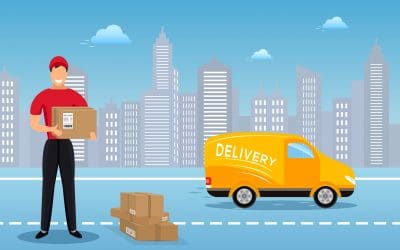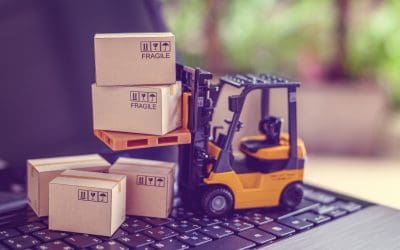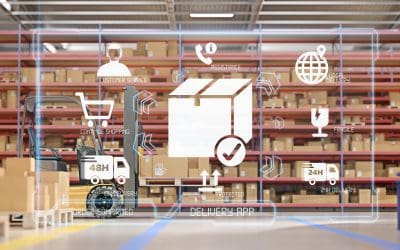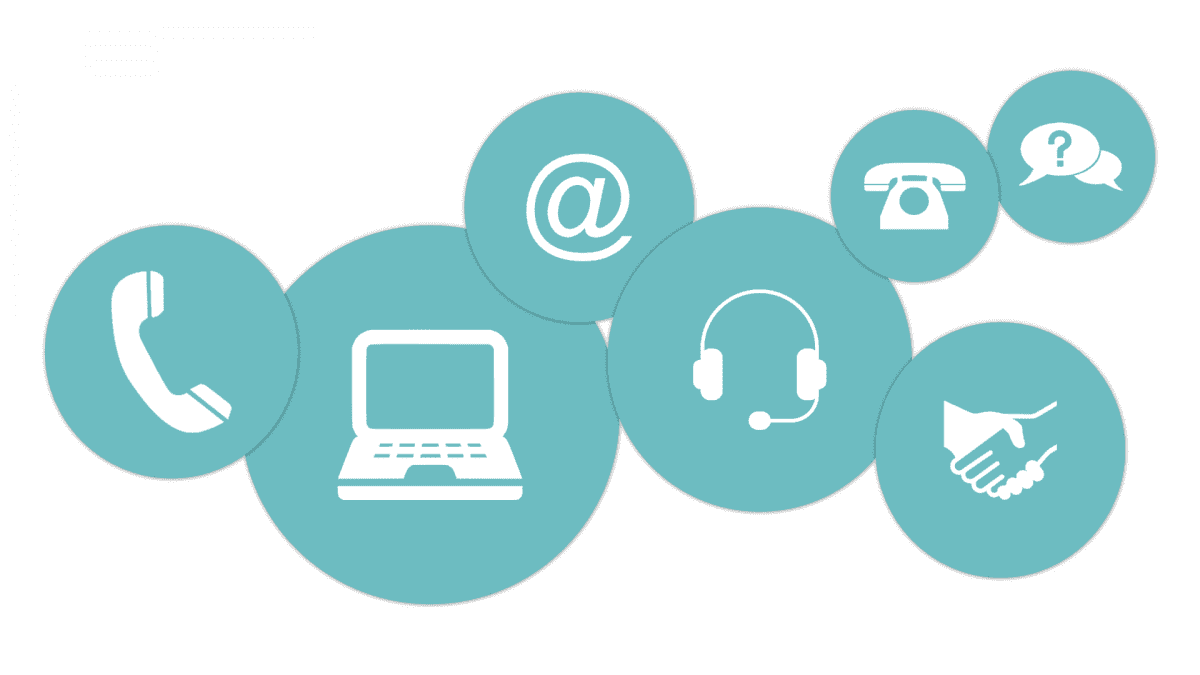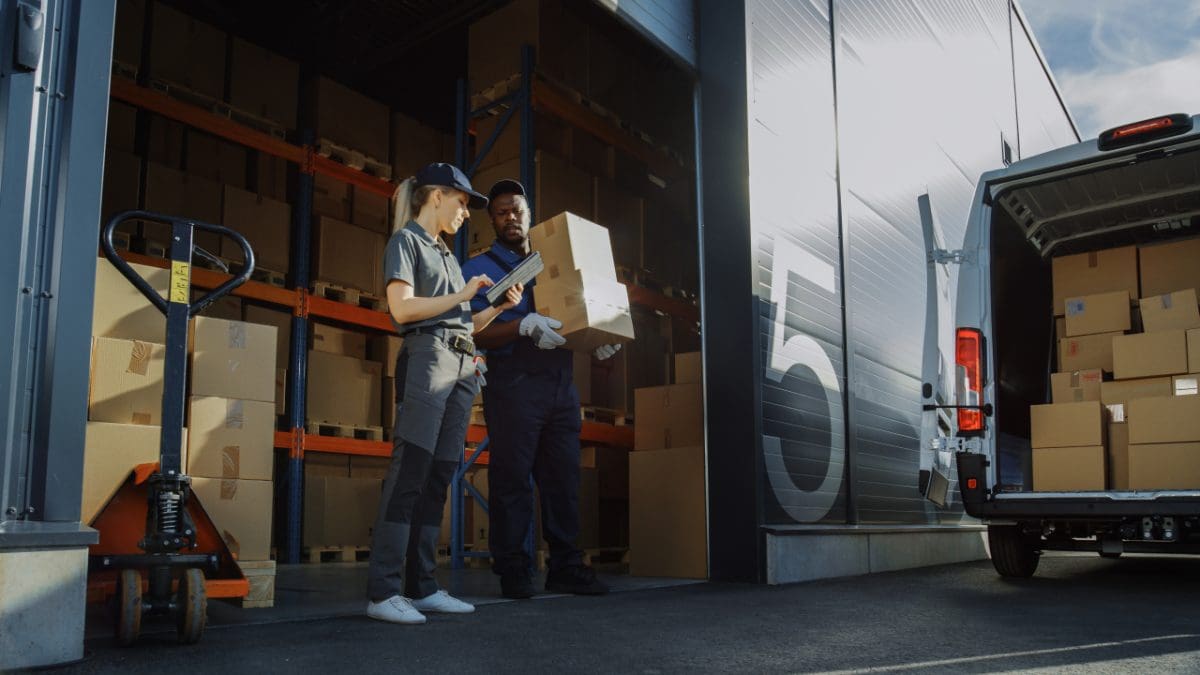
What do most successful B2B companies have in common? You guessed it, exceptional fulfillment services. It doesn’t matter how good the product you’re stocking is or how amazing your marketing campaign is because it won’t do you any good if your fulfillment process is subpar. Done right, B2B fulfillment can optimize efficiency across the entire supply chain. It’s especially important to focus on fulfillment for final mile deliveries because if you don’t get your products delivered to the right place on time, you risk having unhappy and dissatisfied customers… and you know what that means for your bottom line.
Whether you’re a business owner, delivery manager, or anything in between, discover how you can improve your final mile B2B deliveries, one step at a time.
Understanding B2B Fulfillment
Business-to-business (B2B) fulfillment is the process of shipping large orders from businesses to other businesses rather than directly to consumers. One of the most common examples of B2B order fulfillment is wholesale, which is an ordering system that sells products off to retailers who then resell them to the general public.
B2B fulfillment comprises shipping, tracking, and managing products that are sold to businesses. It is a huge part of eCommerce because it is a requirement of any online business to be able to manage the transactions, shipment, and customer service of the products they sell. That being said, B2B fulfillment is a need in the traditional retail industry as well.
How Is It Different from B2C Fulfillment?
B2B fulfillment has unique characteristics and requirements compared to B2C fulfillment.
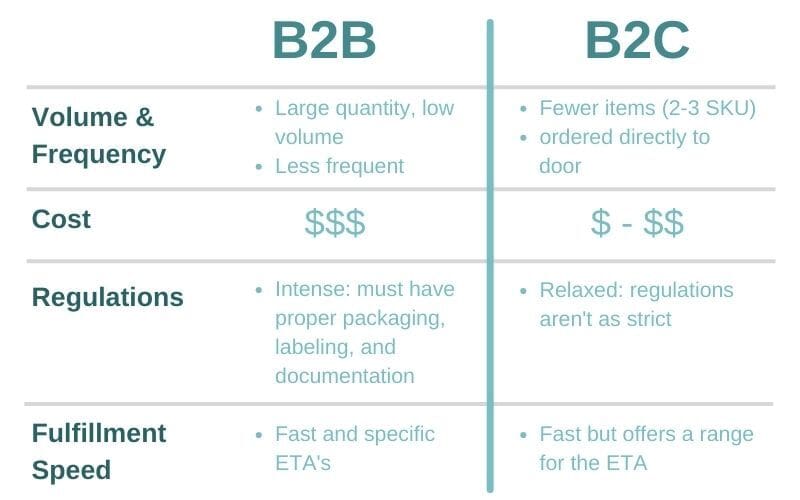
- Volume and Frequency of Orders: B2B orders are typically large in terms of quantity and low in volume. They also happen less frequently, often only every few months. B2C orders, on the hand, entail fewer items in an order but are being delivered directly to customers’ locations. Said differently, customers usually order 2-3 pieces of one SKU (stock-keeping units). Whereas retailers or businesses order hundreds or thousands of units of one SKU.
- Cost: Fulfilling B2B orders is considerably labor-intensive and might sometimes require sophisticated handling equipment like loading and unloading pallets. Inevitably, this costs more than fulfilling B2B orders.
- Regulations: Depending on the industry, B2B orders must comply with lengthy regulations. This may include proper packaging, labeling, documentation, and adherence to hazardous materials regulations if applicable. The regulations get even more complicated when dealing with EDI (Electronic Data Interchange) for data safety and privacy. B2C order fulfillment does have regulations as well, but they are not as complicated as those for B2B fulfillment.
- Fulfillment Speed: While offering lightning-fast delivery is a key factor in enhancing customer experience, B2C orders don’t usually have a definitive time limit for delivery. On the other hand, B2B fulfillment must be delivered at the decided date and time.
Now that you know what B2B fulfillment entails and how it differs from B2C fulfillment, let’s learn what role it plays in enabling final mile deliveries.
How Does B2B Fulfillment Enable Successful Final Mile Deliveries?
In the context of B2B, final mile refers to the final leg of the fulfillment process and involves delivering orders from the last transfer point to the purchasing business. It is often the most expensive and time-consuming part, but it’s also essential to satisfying customers. In this case, customers are the businesses or retailers buying from you.
B2B buyers today want their orders delivered to them as soon as possible, without any hiccups. If a 2022 survey posted on Finances Online is anything to go by, “deployment time or ease of use” ranks in the top five “most important factors for B2B buyers.” It is no longer just about quality and price. As a supplier, it’s time to step up your last-mile delivery process, or you soon won’t be able to compete.
Enter B2B fulfillment, the missing and arguably the most important piece in your final mile delivery puzzle.
First, with B2B fulfillment, economies of scale instantly become an achievable goal. Given there’s room to deliver goods in large quantities, transportation costs per unit will likely reduce. The resulting cost savings can be passed on to customers, making final mile deliveries more effective.
Secondly, enhancing delivery speed is one of final mile delivery’s greatest promises, and it is here that B2B fulfillment thrives most. Because B2B fulfillment often involves managing inventory and shipping from centralized, strategically located distribution centers, it enables routing and planning for final mile deliveries. In such a streamlined, tightly-knit supply chain, the probability of experiencing delivery delays is almost zero.
Third, at the very core of B2B fulfillment lies robust warehousing and inventory capabilities. This ensures that the stocked products are always ready for shipment, which goes a long way in reducing delays in the final mile. Additionally, accurate inventory management enables timely replenishment and helps prevent stock-outs, both prerequisites of fuss-free final mile delivery.
Finally, in a world where customer expectations are incredibly high and ever-changing, B2B fulfillment provides a much-needed reprieve by ensuring products reach businesses promptly and in excellent condition. As the “typical” B2B buyer changes, your final mile delivery process should too. Today, Millennials and Gen Z’s constitute 64% of B2B buyers, according to Forrester. B2B fulfillment allows you to stay ahead of the curve no matter how much audiences or their expectations change.
Key Considerations for B2B Fulfillment in Final Mile Deliveries
What does it take to execute a flawless B2B fulfillment strategy for final mile deliveries? Here are some considerations to keep in mind.
1. Order Accuracy and Precision
Order accuracy is a crucial measure to monitor since it has a significant influence on customer satisfaction. It refers to the proportion of all orders that are completed and delivered on time in full.
B2B buyers want precisely what they ordered. If they cannot rely on you to deliver the correct items consistently and on time, they may have more reasons for returns or replacements. Worse still, they may take their business elsewhere. To retain hard-won customers and promote good reviews, accuracy should be a top priority.
Start by testing packages and average orders. Look through past returns and do test sends to see how boxes and packages stand up during transit. If things bend or break, reinforce your boxes. If orders are arriving incorrectly, look at your internal processes to see where errors can occur. Something as simple as scanning all items in an order three times during the pick-and-pack processes can improve staff efforts and push you above 99% order accuracy.
When you get the order right, there’s much less that can go wrong in the last mile. Continual process checks and improvements keep buyers happy and make you a destination for retailers and businesses.
2. Exploring Inventory Management Strategies to Ensure Product Availability
Efficient inventory management plays a vital role in final mile deliveries. Suppliers need to ensure that products are readily available, properly stored, and accurately tracked within their warehouses.
Here are some strategies you can follow to ensure customers never complain of product shortage:
- Demand Forecasting: Utilize historical data, market trends, and customer insights to accurately forecast demand. Of course, forecasting demand is never 100%, but by anticipating how much you could have in the near future, you can plan ahead and either increase or decrease your inventory investment accordingly.
- Real-Time Inventory Tracking: Since inventory is constantly moving, being able to get real-time inventory insights is crucial. With real-time inventory insights, you can be quick to make decisions based on timely data. That means you can easily replenish items on the go while ensuring seamless order management.
- Last-Mile Warehousing: Consider establishing smaller, strategically located warehouses or fulfillment centers in close proximity to customer clusters. While it seems costly at first glance, you’ll greatly reduce the distance and time required for final mile deliveries sooner rather than later. That’s a big win from a B2B fulfillment point of view.

3. Addressing Packaging and Labeling Requirements
It is true that packaging and labeling of products happen in the fulfillment center and not during the last mile. But think about it, what would happen if the purchasing business receives an incorrectly labeled product or a package with a few missing items? At best, they’ll return the package, which, as you know, is a significant blow to your budget. At worst, they’ll view your business as unprofessional and thus incapable of handling their future orders. So in many ways, packaging and labeling are important aspects of the final mile.
That said, here are some keys to keep in mind with regard to packaging and labeling:
- Clear Labeling: Ensure that packages are clearly labeled with relevant information, including the recipient’s address, contact details, and any special delivery instructions. To prevent any confusion or misplacement during transit, be sure to use high-quality labels and easy-to-read fonts.
- Protective Packaging: Sometimes, the last mile might end up being the longest mile in your supply chain cycle. In that case, it’s best to use appropriate packaging materials that provide sufficient protection during transit and handling. From air pillows and boxes to bubble wraps, cushioning materials are ideal for preventing damage or breakage along the way.
- Product-Specific Packaging: If the products you are transporting are hazardous, perishable, or fragile, then chances are they require specialized packaging. Not only does this help ensure safe transportation, but it also prevents you from flouting relevant regulations.
- Size and Weight Optimization: As a supplier, you know too well that overly large or heavy packages may incur additional charges or pose handling challenges. The best way to drive down transportation costs and maximize space utilization in delivery vehicles is to optimize packaging dimensions and weight. For instance, switching from boxes to poly bags for durable products can produce immense savings in some operations.
4. Analyzing Transportation and Logistics Considerations
As far as B2B fulfillment for final mile delivery goes, it’s not enough to simply know what to do before the products leave the fulfillment center. You also need to figure out the nuts and bolts of their transportation and logistics. What is your plan for when the products finally hit the road? What happens if drivers encounter a hiccup along the way and they have to wait for several hours to get moving again? Do you have a backup plan in place for perishable materials and foods in transit?
Thankfully, having a clear, well-fleshed-out logistics plan can save you the pain of frustrated customers, wasted hours, and inflated transportation costs.
Some of the areas your logistics plan can and should cover include the following:
- Route Optimization: Determine the most efficient paths for your delivery vehicles, taking into account factors like business locations, traffic patterns, and delivery time windows.
- Frequency and Volume of Deliveries: Not all deliveries are the same, so proactive inventory management and planning are essential to ensure prompt order fulfillment.
- Choice of Transportation Vehicles: Whether it’s smaller trucks for short-distance deliveries or large trucks for bulk shipments, your fleet of choice should align with the unique requirements of your final mile delivery process.
- Fleet Tracking and Visibility: Obviously, you won’t be able to closely monitor the movement of your products during the final mile journey if you lack the technology to do so. Step up GPS tracking. By providing real-time visibility, it gives you valuable insights into delivery status, enables proactive problem-solving, and allows for accurate updates to be shared with purchasing businesses.
Technology & Automation
Speaking of technology, the advent of specific tech like Elite EXTRA has automated and continues to automate final mile B2B fulfillment in its entirety. Their sole goal? To increase efficiency and make sure the whole process is as painless and inexpensive as it can possibly be for suppliers, customers, and drivers.
In other words, these technologies do the heavy lifting for you, so you can focus on your customers.
Here are areas where B2B last-mile delivery technologies truly shine:
- Route Planning to Cut Delivery Times: Final mile delivery solutions optimize delivery routes by automatically factoring efficiency, time windows, customer priority, and a lot more to recommend efficient routes.
- Auto Dispatching to Reduce Service Time and Labor Costs: Having a software plan your routes not only saves the time that would be required to do manually but, because routes are updated in real time, can also decrease the number of drivers needed in a day to complete the deliveries.
- Proof of Delivery to Ensure Transparency and Customer Satisfaction: Proof of delivery is documentation that verifies an item has been delivered, like the signature of the recipient. With last-mile logistics software, proof of delivery is made easy. Drivers can complete the entire process via a mobile app, which supports photo collection, signatures, and notes.
- Powerful Reporting for Accountability Purposes: Reporting helps you pinpoint bottlenecks and weaknesses before they become larger issues, as well as opportunities for improvement. With these solutions, you can monitor key metrics, including success rates, feedback scores, on-time rates, distance traveled, and more. You can then filter this data by teams, drivers, day, week, or even by hour of the day, helping you see just how time is being allocated.
- Deliver an Impeccable Customer Experience: If you are focused on taking your customer communications to the next level, then providing B2B buyers with a static tracking number simply isn’t enough. With final mile logistics software, you can keep them informed with email and text notifications, complete with a tracking page to follow their orders. ETAs and order updates can also be viewed by your own team to answer questions on the fly.
The best part is, this is a burgeoning industry with incredible potential for growth. Recent reports indicate that the global last-mile delivery software market will reach a valuation of approximately $16.7 billion by 2032, up from just $7 billion in 2021. With more vendors entering the market and current ones upping their game, there’s every chance that the aforementioned capabilities will only get better. The sooner you dip your toes into this rather promising space, the better for your B2B fulfillment process as a whole, your team, your customers, and most certainly, your bottom line.
Want more industry insights?
Subscribe to our newsletter to receive weekly last mile logistics insights directly to your email inbox each week!
The Need for Continuous Improvement for B2B Fulfillment in the Final Mile
Final mile B2B fulfillment is not a set-and-forget process that you can just shove in the background and let run on autopilot. As a supplier, it is vitally important to practice ongoing evaluation and optimization of the whole process to make sure your business is staying as efficient as competitors.
On paper, the equation of increasing operational efficiency is pretty simple. You want to accomplish all your goals while minimizing your cost and time spent. Continuous improvement efforts help you identify areas where costs can be optimized in the final mile, such as inventory management and route optimization. By regularly reviewing and refining processes, you can reduce costs, enhance profitability, and allocate the oh-so-scarce resources more effectively. From a time savings perspective, improvement allows you to identify bottlenecks, streamline processes, eliminate unnecessary steps, and leverage technology solutions for a truly efficient, fast-moving process.
Now we hear you asking, “How exactly do I monitor and measure the success of my B2B fulfillment strategy in the final mile?” Simple: utilize KPIs.
Here are some important KPIs to consider:
- On-Time Delivery: What percentage of deliveries are made within the agreed-upon window?
- Delivery Accuracy: Of all deliveries made, which ones actually reach the customer without any errors or deficiencies?
- Delivery Cost: From fuel costs to labor expenses, how much do your final deliveries cost in total?
- Delivery Time: How long does it take for deliveries to reach their intended destination?
- Customer Satisfaction: What is the true perception of purchasing businesses towards your final mile delivery process? What kind of experience do they get from start to finish?
- Return Rate: Of all successful deliveries, what percentage find their way back to your fulfillment center? Is your process ailing from product quality or order accuracy issues, or is it something entirely different?
Depending on the nature of your industry and customer requirements, these KPIs may vary considerably. Weigh all of them and only pick the ones that make the most sense for you.
All said and done, remember to keep an eye on evolving customer expectations and market demands. Spurred by an insatiable appetite to navigate towards a superior process or experience, today’s B2B buyers won’t settle for less. They expect faster, more transparent, and streamlined delivery options that won’t have any negative knock-on effects on their end customers. For you to remain relevant and profitable in such a high-pressure, quickly-changing environment, you have to shape up or risk being shaped out. Aim to be as flexible and adaptable as you can possibly be. There is simply no other way.
How Elite EXTRA Can Help With Final-Mile B2B Fulfillment
Now that you’ve learned everything there is to know about B2B fulfillment for final mile deliveries, what next? That’s right, action. Fret not, Elite EXTRA has got your back from here on out.
Elite EXTRA can be a remedy to all your B2B delivery woes, minus the fake promises and overzealous goals typical of so many similar offerings out there. Our powerful software suite provides next-level logistics services, including Routing and Dispatching, Returns Automation and a Delivery Network. Add to that round-the-clock dedicated service for all your support and training needs, and you can be sure we have everything it takes to perfect your B2B order fulfillment process. No fluff, just efficiency. Contact us today to learn how we can help with your final mile B2B fulfillment.
Sources
https://financesonline.com/B2B-statistics
https://www.futuremarketinsights.com/




